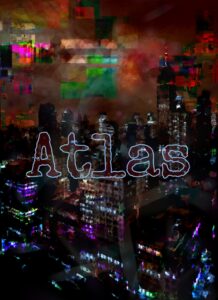For a moment, pulled off balance in the fat stranger’s hug, Bart remained perfectly still, while the man repeated in that loud, jovial voice, “How you’ve grown!” He let him go, stepping away a pace or two, and whispered urgently, “Say something. And take that stupid look off your face.”
As he stepped back, Bart saw his eyes. In the chubby, good-natured red face, the stranger’s eyes were half-mad with fear.
In a split second, Bart remembered the two Lhari and their talk of a fugitive. In that moment, Bart Steele grew up.
He stepped toward the man and took him quickly by the shoulders.
“Dad, you sure surprised me,” he said, trying to keep his voice from shaking. “Been such a long time, I’d—half forgotten what you looked like. Have a good trip?”
“About like always.” The fat man was breathing hard, but his voice sounded firm and cheerful. “Can’t compare with a trip on the old Asterion though.” The Asterion was the flagship of Vega Interplanet, Rupert Steele’s own ship. “How’s everything?”
Beads of sweat were standing out on the man’s ruddy forehead, and his grip on Bart’s wrist was so hard it hurt. Bart, grasping at random for something to say, gabbled, “Too bad you couldn’t get to my graduation. I made th-third in a class of four hundred—”
The Lhari had surrounded them and were closing in.
The fat man took a deep breath or two, said, “Just a minute, Son,” and turned around. “You want something?”
The tallest of the Lhari—the old one, whom Bart had seen on the escalator—looked long and hard at him. When they spoke Universal, their voices were sibilant, but not nearly so inhuman.
“Could we trrrouble you to sssshow us your paperrrssss?”
“Certainly.” Nonchalantly, the fat man dug them out and handed them over. Bart saw his father’s name printed across the top.
The Lhari gestured to a Mentorian interpreter: “What colorrr isss thisss man’s hairrr?”
The Mentorian said in the Lhari language, “His hair is gray.” He used the Universal word; there were, of course, no words for colors in the Lhari speech.
“The man we sssseek has hair of red,” said the Lhari. “And he isss tall, not fat.”
“The boy is tall and with red hair,” the Mentorian volunteered, and the old Lhari made a gesture of disdain.
“This boy is twenty years younger than the man whose description came to us. Why did they not give us a picture or at least a name?” He turned to the other Lhari and said in their own shrill speech, “I suspected this man because he was alone. And I had seen this boy on the upper mezzanine and spoken with him. We watched him, knowing sooner or later the father would seek him. Ask him.” He gestured and the Mentorian said, “Who is this man, you?”
Bart gulped. For the first time he noted the energon-ray shockers at the belts of the four Lhari. He’d heard about those. They could stun—or they could kill, and quite horribly. He said, “This is my father. You want my cards, too?” He hauled out his identity papers. “My name’s Bart Steele.”
The Lhari, with a gesture of disgust, handed them back. “Go, then, father and son,” he said, not unkindly.
“Let’s get going, Son,” said the little bald man. His hand shook on Bart’s, and Bart thought, If we’re lucky, we can get out of the port before he faints dead away. He said “I’ll get a copter,” and then, feeling sorry for the stranger, gave him his arm to lean on. He didn’t know whether he was worried or scared. Where was his father? Why did this man have his dad’s papers? Was his father hiding inside the Lhari ship? He wanted to run, to burst away from the imposter, but the guy was shaking so hard Bart couldn’t just leave him standing there. If the Lhari got him, he was a dead duck.
A copter swooped down, the pilot signaling. The little man said hoarsely, “No. Robotcab.”
Bart waved the copter away, getting a dirty look from the pilot, and punched a button at the stand for one of the unmanned robotcabs. It swung down, hovered motionless. Bart boosted the fat man in. Inside, the man collapsed on the seat, leaning back, puffing, his hand pressed hard to his chest.
“Punch a combo for Denver,” he said hoarsely.
Bart obeyed, automatically. Then he turned on the man.
“It’s your game, mister! Now tell me what’s going on? Where’s my father?“
The man’s eyes were half-shut. He said, gasping, “Don’t ask me any questions for a minute.” He thumbed a tablet into his mouth, and presently his breathing quieted.
“We’re safe—for the minute. Those Lhari would have cut us down.”
“You, maybe. I haven’t done anything. Look, you,” Bart said in sudden rage, “you owe me some explanations. For all I know, you’re a criminal and the Lhari have every right to chase you! Why have you got my father’s papers? Did you steal them to get away from the Lhari? Where’s my father?“
“It’s your father they were looking for, you young fool,” said the man, gasping hard. “Lucky they had only a description and not a name—but they’ve probably got that by now, uncoded. We’ve only confused them for a little while. But if you hadn’t played along, they’d have had you watched, and when they get hold of the name Steele—they will, sooner or later, the people in the Procyon system—”
“Where is my father?”
“I hope I don’t know,” the fat man said. “If he’s still where I left him, he’s dead. My name is Briscoe. Edmund Briscoe. Your father saved my life years ago, never mind how. The less you know, the safer you’ll be for a while. His major worry just now is about you. He was afraid, if he didn’t turn up here, you’d take the first ship back to Vega. So he gave me his papers and sent me to warn you—”
Bart shook his head. “It all sounds phony as can be. How do I know whether to believe you or not?” His hand hovered over the robotcab controls. “We’re going straight to the police. If you’re okay, they won’t turn you over to the Lhari. If you’re not—”
“You young fool,” said the fat man, with feeble violence, “there’s no time for all that! Ask me questions—I can prove I know your father!”
“What was my mother’s name?”
“Oh, God,” Briscoe said, “I never saw her. I knew your father long before you were born. Until he told me, I never knew he’d married or had a son. I’d never have known you, except that you’re the living image—” He shook his head helplessly, and his breathing sounded hoarse.
“Bart, I’m a sick man, I’m going to die. I want to do what I came here to do, because your father saved my life once when I was young and healthy, and gave me twenty good years before I got old and fat and sick. Win or lose, I won’t live to see you hunted down like a dog, like my own son—”
“Don’t talk like that,” Bart said, a creepy feeling coming over him. “If you’re sick, let me take you to a doctor.”
Briscoe did not even hear. “Wait, there is something else. Your father said, ‘Tell Bart I’ve gone looking for the Eighth Color. Bart will know what I mean.'”
“That’s crazy. I don’t know—”
He broke off, for the memory had come, full-blown:
He was very young: five, six, seven. His mother, tall and slender and very fair, was bending over a blueprint, pointing with a delicate finger at something, straightening, saying in her light musical voice:
“The fuel catalyst—it’s a strange color, a color you never saw anywhere. Can you think of a color that isn’t red, orange, yellow, green, blue, violet, indigo or some combination of them? It isn’t any of the colors of the spectrum at all. The fuel is a real eighth color.”
And his father had used the phrase, almost adopted it. “When we know what the eighth color is, we’ll have the secret of the star-drive, too!”
Briscoe saw his face change, nodded weakly. “I see it means something to you. Now will you do as I tell you? Within a couple of hours, they’ll be combing the planet for you, but by that time the ship I came in on will have taken off again. They only stop a short time here, for mail, passengers—no cargo. They may get under way again before all messages are cleared and decoded.” He stopped and breathed hard. “The Earth authorities might protect you, but you would never be able to board a Lhari ship again—and that would mean staying on Earth for the rest of your life. You’ve got to get away before they start comparing notes. Here.” His hand went into his pockets. “For your hair. It’s a dye—a spray.”
He pressed a button on the bulb in his hand; Bart gasped, feeling cold wetness on his head. His own hand came away stained black.
“Keep still.” Briscoe said irritably. “You’ll need it at the Procyon end of the run. Here.” He stuck some papers into Bart’s hand, then punched some buttons on the robotcab’s control. It wheeled and swerved so rapidly that Bart fell against the fat man’s shoulder.
“Are you crazy? What are you going to do?”
Briscoe looked straight into Bart’s eyes. In his hoarse, sick voice, he said, “Bart, don’t worry about me. It’s all over for me, whatever happens. Just remember this. What your father is doing is worth doing, and if you start stalling, arguing, demanding explanations, you can foul up a hundred people—and kill about half of them.”
He closed Bart’s fingers roughly over the papers. The robotcab hovered over the spaceport. “Now listen to me, very carefully. When I stop the cab, down below, jump out. Don’t stop to say good-bye, or ask questions, or anything else. Just get out, walk straight through the passenger door and straight up the ramp of the ship. Show them that ticket, and get on. Whatever happens, don’t let anything stop you. Bart!” Briscoe shook his shoulder. “Promise! Whatever happens, you’ll get on that ship!”
Bart swallowed, feeling as if he’d been shoved into a silly cops-and-robbers game. But Briscoe’s urgency had convinced him. “Where am I going?”
“All I have is a name—Raynor Three,” Briscoe said, “and the message about the Eighth Color. That’s all I know.” His mouth twisted again in that painful gasp.
The cab swooped down. Bart found his voice. “But what then? Is Dad there? Will I know—”
“I don’t know any more than I’ve told you,” Briscoe said. Abruptly the robotcab came to a halt, swaying a little. Briscoe jerked the door open, gave Bart a push, and Bart found himself stumbling out on the ramp beside the spaceport building. He caught his balance, looked around, and realized that the robotcab was already climbing the sky again.
Immediately before him, neon letters spelled TO PASSENGER ENTRANCE ONLY. Bart stumbled forward. The Lhari by the gate thrust out a disinterested claw. Bart held up what Briscoe had shoved into his hand, only now seeing that it was a thin wallet, a set of identity papers and a strip of pink tickets.
“Procyon Alpha. Corridor B, straight through.” The Lhari gestured, and Bart went through the narrow passageway, came out at the other end, and found himself at the very base of a curving stair that led up and up toward a door in the side of the huge Lhari ship. Bart hesitated. In another minute he’d be on his way to a strange sun and a strange world, on what might well be the wild-goose chase of all time.
Passengers were crowding the steps behind him. Someone shouted suddenly, “Look at that!” and someone else yelled, “Is that guy crazy?”
Bart looked up. A robotcab was swooping over the spaceport in wild, crazy circles, dipping down, suddenly making a dart like an enraged wasp at a little nest of Lhari. They ducked and scattered; the robotcab swerved away, hovered, swooped back. This time it struck one of the Lhari grazingly with landing gear and knocked him sprawling. Bart stood with his mouth open, as if paralyzed.
Briscoe! What was he doing?
The fallen Lhari lay without moving. The robotcab moved in again, as if for the kill, buzzing viciously overhead.
Then a beam of light arced from one of the drawn energon-ray tubes. The robotcab glowed briefly red, then seemed to sag, sink together; then puddled, a slag heap of molten metal, on the glassy floor of the port. A little moan of horror came from the crowd, and Bart felt a sudden, wrenching sickness. It had been like a game, a silly game of cops and robbers, and suddenly it was as serious as melted death lying there on the spaceport. Briscoe!
Someone shoved him and said, “Come on, quit gawking, kid. They won’t hold the ship all day just because some nut finds a new way to commit suicide.”
Bart, his legs numb, walked up the ramp. Briscoe had died to give him this chance. Now it was up to him to make it worth having.







